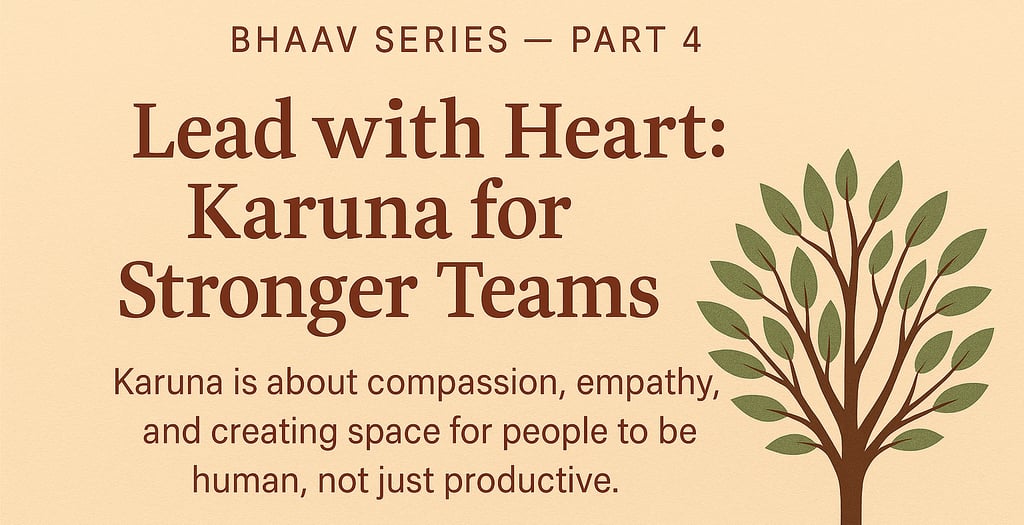Bhaav Series - Part 4 of 15 : Lead with Heart: Karuna for Stronger Teams
In the fourth part of the Bhaav Series, we explore Karuna—the emotion of compassion—as a powerful force in building resilient, connected teams. Rooted in Indian wisdom, Karuna is more than empathy—it’s the strength to lead with heart in high-pressure work environments. This post shares simple, relatable examples of how compassion at the workplace nurtures trust, psychological safety, and loyalty. Whether you're a team leader or collaborator, this blog invites you to rediscover emotional intelligence as a core leadership quality.
Abhay Jaiswal
4/21/20253 min read


In the structured chaos of modern work life—meetings, deadlines, appraisals, targets—we often forget one powerful human quality that creates truly resilient teams: Karuna, the emotion of compassion.
In Indian philosophy, Karuna is much more than sympathy or kindness. It is a deep emotional intelligence—a mindful presence that notices pain, honours it, and responds with dignity.
It’s not about rescuing others. It’s about standing beside them when they need to feel seen, heard, and safe.
What Does Karuna Look Like at Work?
It doesn’t have to be dramatic or grand. Karuna often shows up in small, everyday actions—the kind that don’t make headlines but change work culture quietly:
A manager saying, “Take the day off, your health matters more than the deadline.”
A team member asking, “Hey, you’ve been quiet lately. Want to talk?”
Giving someone the space to fail, reflect, and try again—without judgement.
Understanding when someone needs time to grieve, process, or simply breathe.
Celebrating progress, not just perfection.
These gestures may not show up in metrics.
But they build what numbers alone cannot—trust, belonging, and loyalty.
Karuna is Strength, Not Softness
Compassion at work is often misunderstood. Some may see it as being “too emotional” or “too soft.”
But Karuna is not weakness—it is emotional strength with awareness.
It requires presence, patience, and maturity. It takes courage to hold space for others without needing to fix or control.
Teams that feel safe are teams that:
Speak honestly, without fear of punishment
Ask for help, without shame
Own up to mistakes, without hiding
Support one another, without keeping score
Safe teams are strong teams, and Karuna builds safety.
Leadership Rooted in Empathy
The best leaders aren’t just good at managing numbers—they are tuned in to emotions. They know when someone is burning out, when a silent team member needs encouragement, when a conflict needs gentleness instead of discipline.
Karuna doesn’t take away from performance—it enhances it. Because when people feel cared for, they give their best not out of fear, but out of commitment.
Even if you aren’t a “leader” by title, you still have influence.
Your way of checking in, holding space, and responding to struggle with grace can shift the emotional temperature of your entire team.
How Karuna Makes Teams Stronger
Some may argue that compassion makes us “too soft” for the demands of modern work. But here’s the truth: compassion is a strength multiplier.
Compassion builds trust. When people feel understood, they open up, collaborate more freely, and bring their authentic selves to work.
It creates psychological safety. Teams that feel safe make bolder decisions, innovate more, and recover faster from failure.
It reduces burnout. Empathy-driven leadership creates a culture where wellbeing matters—not just output.
It fosters loyalty and belonging. Employees are more likely to stay in places where they feel valued, not just measured.
In Practice: Leading with Karuna
You don’t need to meditate for hours or read philosophy to bring Karuna into your workspace.
Start with awareness:
Pause before responding when someone is stressed
Assume good intent
Replace judgement with curiosity: “What’s really going on?”
Listen—not to reply, but to truly understand
Create space for emotions, not just efficiency
These practices don’t slow us down. They make us human again—and that’s what the modern workplace needs the most.
Final Thoughts
Karuṇa is not about fixing everyone’s problems. It’s about being present, listening deeply, and responding with humanity. In doing so, we don’t just create better teams—we create workplaces where people flourish.
Coming Up Next: From Frustration to Fuel: Channeling Raudra at Work
in Next Post, we dive into the intensity of Raudra—the bhaav of anger and fierce energy. Not all anger is destructive. When expressed with awareness, it becomes assertiveness, courage, and clarity—a much-needed force in leadership and transformation.
Until then, take a moment to lead with presence, to notice your team beyond their tasks, and to bring a little more Karuna into your workday. Sometimes, the strongest leaders are the ones who choose kindness.
#BhaavSeries #Karuna #EmpathyAtWork #CompassionInLeadership #SafeTeams #IndianWisdom #WorkplaceWellness #EmotionalIntelligence #HeartCenteredLeadership
Committed for better India 🇮🇳 © 2025 ABHAY JAISWAL
